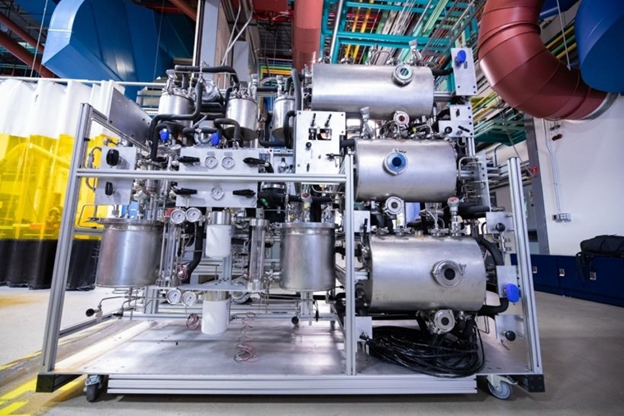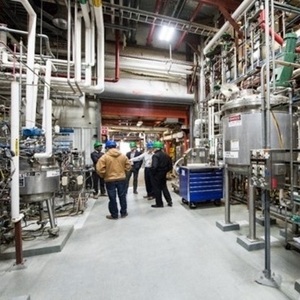National lab pilot plants help industry de-risk biofuel processes



SOURCE: Dennis Schroeder, NREL
November 22, 2023
BY U.S. Department of Energy
We are witnessing a renaissance of innovation in sustainable fuels. Established corporations and small startups around the world are proposing novel solutions for turning abundant renewable carbon resources into energy-dense, low-carbon fuels that are key to addressing climate change. One of the most impressive innovations is the development of sustainable aviation fuel (SAF) made from biomass, waste, carbon dioxide (CO2), and other feedstocks that can dramatically lower the greenhouse gas footprint of the largest airliners and the fastest jets.
However, to meet national goals for producing billions of gallons of climate-friendly SAF by mid-century, companies need to carefully test and optimize their biorefining processes—especially before breaking ground on multimillion-dollar biorefineries. Companies need to gather data at an integrated, intermediate scale and they must reduce risks inherent to bringing new technologies to market.
In short, biorefining companies need pilot plants.
From small steps to large-scale demonstration
Pilot plants are biorefineries in miniature that let researchers validate equipment, reduce risks and test processes, and scrutinize production cycles over longer periods of time. By incorporating smaller fuel volumes and downsized equipment— with conditions and configurations that mirror full-scale facilities—pilot plants make it easier to collect critical data companies need to perfect even the smallest components.
With support from the U.S. Department of Energy Bioenergy Technologies Office, national laboratories like the National Renewable Energy Laboratory can offer customizable pilot plants, laboratory equipment, and even supercomputers that industry can use to support larger-scale SAF demonstration—all without shouldering the cost of building facilities or purchasing specialized equipment.
Below are a few examples of how researchers and companies are already using pilot plants to scale their technologies:
Advertisement
Sustainable aviation fuel from renewable ethanol in NREL’s Integrated Biorefinery Research Facility
The stainless-steel tanks, sacks of agricultural waste, and malty, beer-like aroma leave little doubt on what research is underway at NREL’s Integrated Biorefinery Research Facility. Researchers are leveraging enzymes to break the chemical bonds of biomass—through hydrolysis and other biological processes—yielding sugars and compounds easily converted into energy-dense fuels via fermentation.
The IBRF handles the gamut of biomass feedstocks and is designed to integrate third-party processes and equipment so partners can validate conversion processes at a pilot scale. Lately, a big focus has been on corn stover—agricultural waste that NREL scientists and partners have shown can be affordably deconstructed, fermented into ethanol, and finally upgraded into energy-dense SAF.
In partnership with BETO, D3MAX LLC, Southwest Airlines, LanzaJet, Novozymes, and others, NREL is using the IBRF to support the Renewable Ethanol (SAFFiRE) project. SAFFiRE is among a handful of economical, proven technologies capable of producing SAF that is less expensive than petroleum-based jet fuel and that can reduce carbon emissions dramatically—over 80% on a life cycle basis.
The process hinges on NREL’s patent-pending deacetylation and mechanical refining pretreatment process, developed in the IBRF to sidestep challenges with previous corn stover pretreatment technologies. It effectively boosts ethanol yields by 14 percent and lowers costs by 33 cents per gallon.
Advertisement
Pyrolyzing, gasifying, and catalyzing in NREL’s field test laboratory building
Whereas the biomass conversion workhorses in the IRBF are enzymes and microbes, in NREL’s Field Test Laboratory Building (FTLB), they are high heat and catalysts. The FTLB is a customizable facility that gives companies access to a range of bench- and pilot-scale reactors, gasifiers, risers, hydrotreaters, and supporting analytical equipment. Together, these diverse capabilities let industry partners model and assess equally diverse methods for turning biomass, waste, and CO2 into fuel.
Start small. Grow from there. But do it quickly.
The principle “start small and grow from there” rings true in the world of biofuels. As companies around the world race to produce billions of gallons of low-carbon SAF by 2050, we need incremental growth to accelerate faster than ever before. We are operating on a collapsed timeline.
Through the SAF Grand Challenge, the White House has set a goal of establishing four demonstration biofuels plants by 2030, earmarking financial support for companies that prove their technologies are ready for scale up. Getting there will require investment, research partnerships, rigorous and creative engineering, teamwork, and tenacity. But success will ultimately hinge on pilot plants and the indispensable data they provide.
Pilot plants may be expensive, but they are essential, and national laboratories can help companies access their benefits to validate and rapidly scale their technologies.
Related Stories
NREL announced the findings of the Assessment of BQ-9000 Biodiesel Properties for 2024, the eighth in a series of annual reports documenting the quality of biodiesel from U.S. and Canadian producers participating in the BQ-9000 program.
Kintetsu World Express Inc. has entered into a new agreement with Shell Aviation regarding the use of SAF. Under this agreement, KWE will adopt Shell Aviation's digital platform "Avelia" to swiftly address shippers' low-carbon transportation needs.
Aemetis Inc. released Q2 results, reporting increase revenue when compared to Q1. During an earnings call, company officials detailed progress with the company’s RNG, ethanol, biodiesel, SAF and carbon CCS projects.
Calumet Inc. on Aug. 8 confirmed its Montana Renewables biorefinery is currently running at full capacity. An initial phase of the company’s MaxSAF initiative remains on track to boost SAF capacity to up to 150 MMgy by mid-2026.
Marathon Petroleum Corp. on Aug. 5 released second quarter financial results, reporting improved EBITDA for its renewable diesel segment. The company primarily attributed the improvement to increased utilization and higher margins.
Upcoming Events










